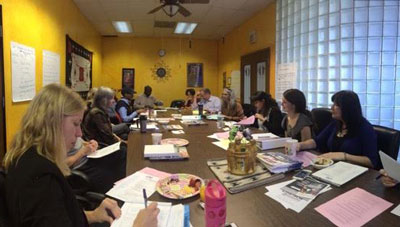Five-Year Study to Map out Success Factors for Long-Standing Community-Academic Partnerships
 As an extension of its community-based participatory research (CBPR) capacity-building efforts, the Detroit Urban Research Center (Detroit URC) has launched a new five-year, $2.8 million study called Measurement Approaches to Partnership Success (MAPS): An Innovative Tool for Assessing Long-Standing CBPR Partnerships.
As an extension of its community-based participatory research (CBPR) capacity-building efforts, the Detroit Urban Research Center (Detroit URC) has launched a new five-year, $2.8 million study called Measurement Approaches to Partnership Success (MAPS): An Innovative Tool for Assessing Long-Standing CBPR Partnerships.
Funded by the National Institute of Nursing Research (NINR) as part of its “Advancing Science, Improving Lives” Strategic Plan, the MAPS project aims to develop a clear definition of success in long-standing CBPR partnerships, a specific set of factors that contribute to it, and a practical tool for measuring these factors that others across the U.S. can use to assess and strengthen their own partnership efforts to achieve health equity.
“The research community is well equipped with data-driven information about how to form a CBPR partnership, and why it’s important to do so,” said MAPS Principal Investigator Laurie Lachance, Associate Research Scientist at the University of Michigan (U-M) School of Public Health (SPH) Health Behavior and Health Education (HBHE) Department, “however, there is a significant, nationwide gap in terms of tools for helping to make sure these partnerships are successful long term. We look forward to filling this pressing gap.”
As the driving force behind MAPS, the Detroit URC Board will oversee all aspects of the MAPS project. The Board is comprised of representatives from nine community-based organizations in Detroit — Communities In Schools, Community Health and Social Services, Center, Inc., Detroit Hispanic Development Corporation (DHDC), Detroiters Working for Environmental Justice, Eastside Community Network, Friends of Parkside, Latino Family Services, Institute for Population Health; and Neighborhood Service Organization — two health institutions, the Detroit Health Department and Henry Ford Health System; and faculty members from the U-M Schools of Public Health, Social Work, and Nursing.
The MAPS project is receiving additional input and guidance from a 16-member Expert Panel, consisting of an equal number of community and academic members from across the U.S. The three Principal Investigators for the project are as follows:
- Barbara L. Brush is the Carol J. and F. Edward Lake Professor in Population Health in the U-M School of Nursing, and former Faculty Director of the Michigan Institute of Health and Clinical Research’s Public Partners and Community-Based Organizations section. She brings years of community-engaged research and practice experience to the study team.
- Barbara A. Israel is a Professor in the U-M SPH Department of HBHE, Director of the Detroit URC, and a leading scholar in CBPR. Dr. Israel is also the co-editor of Methods for Community-Based Participatory Research for Health. She has extensive experience in the conceptualization and implementation of CBPR efforts, including etiologic and intervention research, partnership evaluation, dissemination, translation and capacity building.
- Laurie Lachance is Associate Research Scientist at the U-M SPH Department of HBHE and Evaluation Director of the Center for Managing Chronic Disease at U-M SPH. Dr. Lachance has extensive experience conducting evaluations for large-scale, national public health programs and partnership initiatives that work toward increasing health equity. Her work utilizes community-based approaches and includes efforts aimed at policy, systems, and health behavior change.
In addition, several other U-M researchers along with Detroit community partners are serving as key members of the MAPS team. (Visit the MAPS project webpage for a detailed list of project personnel.)
Angela Reyes, Detroit URC Board member and DHDC Founding Director, is also on the MAPS Expert Panel and offers nearly three decades of CBPR experience and expertise.
“There are a lot of burgeoning CBPR partnerships focused on making a positive difference in the health and wellbeing of their communities,” Reyes said, “I am very hopeful that the MAPS project will help to boost the effectiveness and sustainability of such partnerships across the country for years to come.”
For more information, please visit the MAPS webpage at detroiturc.org/affiliated-partners/maps. You may also contact MAPS Project Manager Megan Jensen at (734) 764-6029 or This email address is being protected from spambots. You need JavaScript enabled to view it..
NOTE: The Federal Award Identification number (FAIN) for this NINR-funded project is R01NR016123.



